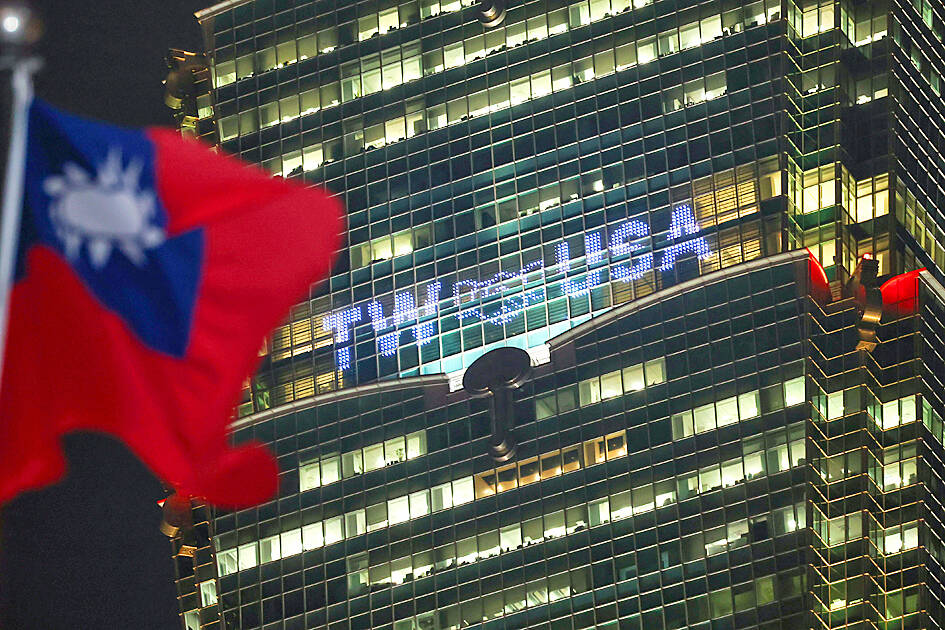More than 40 percent of Taiwanese respondents believe that the US’ commitment to protecting Taiwan would decline during US President Donald Trump’s second term, compared with the level of support under his predecessor, former US president Joe Biden. The findings come from the “American Portrait Survey,” conducted by Academia Sinica, Taiwan’s leading research institution, in mid-March.
In the survey of 1,249 adults, 21.1 percent said they expected the US to show “much less” commitment to Taiwan’s security under Trump, while another 23.3 percent anticipated “somewhat less” support.
While 5.7 percent of respondents said they believed the US would show “somewhat more” commitment to Taiwan’s defense under Trump and 4.6 percent expected “much more,” the largest share — 38.5 percent — anticipated the level of protection would “remain the same” as in the past few years before Trump returned to the White House on Jan. 20.

Photo: CNA
Asked whether they were concerned that the US and China might reach agreements that could compromise Taiwan’s national interests, 59 percent of respondents said they were.
The survey — part of an annual Taiwan-based assessment of public perceptions of the US and China — was released on Friday by Wu Wen-chin (吳文欽), a research fellow at Academia Sinica’s Institute of Political Science, during a seminar in Taipei.
Wu said that the results reflect growing unease among Taiwanese regarding Trump’s foreign policy approach and its potential impact on Taiwan-US relations.
In last year’s edition of the survey, conducted while Biden was still president, Taiwanese were asked whether the US would deploy troops if China launched an invasion of Taiwan. At the time, 15.3 percent said the US “definitely would not” intervene, while 16.4 percent said it was “unlikely.”
One year later, this year’s survey revealed a significant increase in skepticism. The share of respondents who believed the US “definitely would not” intervene rose to 18.7 percent, and those who said it was “unlikely” climbed to 23.7 percent — a combined increase of more than 10 percent.
Perceptions of US trustworthiness also declined. Last year, 50 percent of respondents disagreed with the statement that the US is a trustworthy country. That figure jumped to 59.6 percent in this year’s survey.
Funded by Academia Sinica’s Institute of European and American Studies, the survey is part of a research program that began in 2021 and is expected to run for 10 years.
This year’s edition was carried out by the Election Study Center at National Chengchi University through telephone interviews conducted from March 18 to 23. It collected 1,249 valid responses from individuals aged 20 and older with household registration in Taiwan. The margin of error was plus or minus 2.77 percent.

Alain Robert, known as the "French Spider-Man," praised Alex Honnold as exceptionally well-prepared after the US climber completed a free solo ascent of Taipei 101 yesterday. Robert said Honnold's ascent of the 508m-tall skyscraper in just more than one-and-a-half hours without using safety ropes or equipment was a remarkable achievement. "This is my life," he said in an interview conducted in French, adding that he liked the feeling of being "on the edge of danger." The 63-year-old Frenchman climbed Taipei 101 using ropes in December 2004, taking about four hours to reach the top. On a one-to-10 scale of difficulty, Robert said Taipei 101

Taiwanese and US defense groups are collaborating to introduce deployable, semi-autonomous manufacturing systems for drones and components in a boost to the nation’s supply chain resilience. Taiwan’s G-Tech Optroelectronics Corp subsidiary GTOC and the US’ Aerkomm Inc on Friday announced an agreement with fellow US-based Firestorm Lab to adopt the latter’s xCell, a technology featuring 3D printers fitted in 6.1m container units. The systems enable aerial platforms and parts to be produced in high volumes from dispersed nodes capable of rapid redeployment, to minimize the risk of enemy strikes and to meet field requirements, they said. Firestorm chief technology officer Ian Muceus said

MORE FALL: An investigation into one of Xi’s key cronies, part of a broader ‘anti-corruption’ drive, indicates that he might have a deep distrust in the military, an expert said China’s latest military purge underscores systemic risks in its shift from collective leadership to sole rule under Chinese President Xi Jinping (習近平), and could disrupt its chain of command and military capabilities, a national security official said yesterday. If decisionmaking within the Chinese Communist Party has become “irrational” under one-man rule, the Taiwan Strait and the regional situation must be approached with extreme caution, given unforeseen risks, they added. The anonymous official made the remarks as China’s Central Military Commission Vice Chairman Zhang Youxia (張又俠) and Joint Staff Department Chief of Staff Liu Zhenli (劉振立) were reportedly being investigated for suspected “serious

Nipah virus infection is to be officially listed as a category 5 notifiable infectious disease in Taiwan in March, while clinical treatment guidelines are being formulated, the Centers for Disease Control (CDC) said yesterday. With Nipah infections being reported in other countries and considering its relatively high fatality rate, the centers on Jan. 16 announced that it would be listed as a notifiable infectious disease to bolster the nation’s systematic early warning system and increase public awareness, the CDC said. Bangladesh reported four fatal cases last year in separate districts, with three linked to raw date palm sap consumption, CDC Epidemic Intelligence